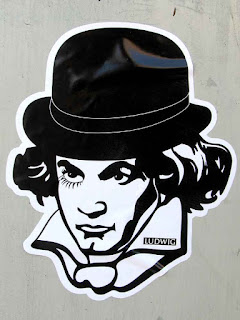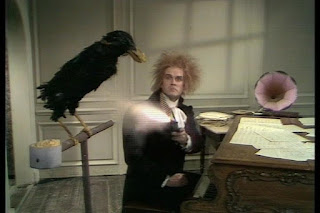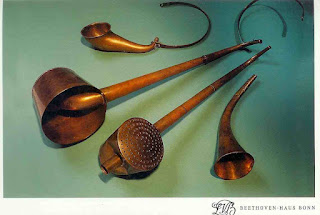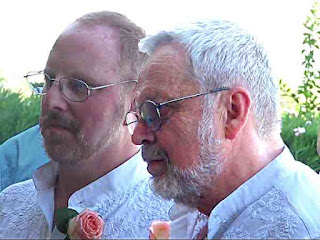Timothy Mangan, the last full-time newspaper music critic in
O.C., has a
blog. (which is not true of the last full-time newspaper music critic in L.A.)
Tim posted an excerpt written by
H.L. Mencken at the time of the
Scopes Trial, 1925. It's about Beethoven. Go read it now:
Beethoven and the Scopes Trial. Reading it is important because Tim's bosses
probably peg his salary to how many hits his blog gets.
The excerpt really pushed my buttons. It smacks of vile cultural elitism coated with that sickeningly childish Beethoven worship which I hate so much. It made me want to rant.

Of course it's entirely possible that Mencken has his tongue firmly in his cheek. How am I to be sure - with no smiley faces in the text?
It starts out like one of those "
There are two kinds of people..." jokes. For example: "
There are three kinds of people - those who understand math and those who don't." Warning: certain mathematical concepts will be abused in this post.

Here's an excerpt from Mencken's excerpt:
The intellectual heritage of the race belongs to the minority, and to the minority only ... That is why Beethoven survives. Of the 110,000,000 so-called human beings who now live in the United States ... it is probable that at least 108,000,000 have never heard of him at all.
I have no clue how many people in the US in 1925 had actually heard of Beethoven. Neither did Mencken. He was making up his facts ("
it is probable"). That's an old journalistic tradition now preserved mainly by us bloggers. These days real journalists are into "fact checking". (Quick, name the
capital city of Mongolia. )
Let's take Mencken at his word and stipulate that in 1925 about two percent of Americans actually knew who Beethoven was and the rest would have lynched him in the street for the crime of being meaningful and for coming back from the dead.

But times have changed. Allowing for the three-fold increase in U.S. population, no one could claim in 2008 that only 6 million Americans have ever heard of Beethoven. Any other composer (except Mozart), maybe, but not Beethoven.
I wanted to shout back at the excerpt: "
Hey, H.L. Now-a-days, thanks to our limited choices of infotainment conglomerates, the U.S. is homogenized pretty thoroughly. We've all heard of the same stuff - including Beethoven."
 We here at Mixed Meters set out to prove the point that everybody knows Beethoven by conducting a poll.
We here at Mixed Meters set out to prove the point that everybody knows Beethoven by conducting a poll. The sample was small (9 responses) but the results prove the hypothesis so why bother going on. (
Call that going, call that on.)
METHODOLOGY: I told each person that I had a question and asked for the first answer that popped into their head. No thinking, please. The question was:
"Name a classical composer." (Not really a question, but hey.)
DATA: Here are the answers listed in descending frequency together with the first names of the respondents:
- Beethoven (Kevin, Sean, Claudia and Tom)
- Mozart (Rose and Lucy)
- Bach (Sandra)
- Brahms (Kristina)
- Takemitsu (Daniel)

Most of the answers were immediate, almost joyful. The exception was Claudia, secretary at an auto repair shop, who needed nearly a minute of her deepest cogitation before she came up with an answer, any answer (which she mispronounced.) But she knew "Beethoven".
Daniel's unexpected answer stems from the fact that he's a professional composer, the only trained musician in the sample. He cheated by thinking for several seconds before answering.
My poll has a
probable margin of error of 25%. Remember: the "
probable" - like Mencken I make up facts too. Please attempt to reproduce my results with polls of your own and post the
probable results as comments below.
 CONCLUSION
CONCLUSION: Forty-four percent of all Americans think of Beethoven first when they consider classical composers. If the question instead had been "Who is Beethoven?"
my poll would have shown name recognition of 100% or more. That's because anyone who knows of Bach, Mozart, Brahms or Takemitsu
probably knows of Beethoven too.

Poor Ludwig is now a cultural icon considerably separate from the appreciation of his music. Beethoven, who could still write music even after he went deaf. Beethoven, who overcame insurmountable obstacles. The Beethoven of
Disney movies,
disco hits,
dog movies, strange rock band names and the John Thompson arrangement of
Ode to Joy, among others.
We have made Beethoven's life's lemonade into a cultural kool-aid so diluted that everyone has tasted it but no one need be affected by it. The more diluted he becomes the less meaningful he gets. If people don't know why Beethoven is famous, they still know that he IS famous.
Famous for being famous. Zsa Zsa Gabor.

Mencken goes on to tell us what would happen if the 1925 unwashed did take notice of our hero composer. He doesn't even say "
probably".
If [Beethoven's music] could be brought within range, it would at once arouse hostility. Its complexity would challenge; its lace of moral purpose would affright. Soon there would be a movement to put it down, and Baptist clergymen would range the land denouncing it, and in the end some poor musician, taken in the un-American act of playing it, would be put on trial before a jury of Ku Kluxers, and railroaded to the calaboose.
Okay, I get it now. Beethoven is really a stalking horse for Mencken's real target - the anti-teaching-of-evolution crowd. He wants to show us how stupid those people really are by telling us about the bonehead stunts they would pull if they catch up with the poor unsuspecting Ludwig.
How much have things changed since 1925?
Suppose that in 2008 a teacher were arrested somewhere in America, just as John Scopes was in 1925, for telling his class about evolution. Could it happen? Would you be surprised? I wouldn't. The battle over teaching the idea of evolution continues to this day.
Could a contemporary journalist attack the opinions held by creationists (or neo-cons or right-to-lifers or some other deserving group) by describing their
probably hateful retribution on a ... composer? A composer of music? I doubt it. A blogger might try it, but not a real journalist.
Which composer's villification at the hands of the cretinous masses would arouse the most sympathy among us - the good people?
Copland?
Carter?
Leiber and Stoller?
Keith Burstein?
Richard Thomas? In the wildest journalistic imagination could any composer be plausibly turned into the next
Andres Serrano or
Robert Mapplethorpe?
In a word, no. That is because
it is probable that 98% of all Americans these days don't know any contemporary composers at all, and if they did - unlike in Mencken's hypothesis - their reaction to finding out about them would be the shrugging of shoulders and the changing of channels.

And what of Poor Beethoven in all this? Suppose he did come back from the dead, hearing restored, to observe the holy adulations he so regularly receives. What would he think of his universal name recognition? Would be giggle nervously when asked about
Immortal Beloved? I don't know.
But
it is probable that if he actually listened (for the first time ever) to a performance of his own Ninth Symphony he would say "
That's awful. I must completely rewrite it."

=-=-=-=-=-
The picture of John Belushi as Beethoven channeling Ray Charles on Saturday Night Live comes from
here.The Beethoven figurine picture comes from
here.The picture of Beethoven's skull comes from
here.The picture of John Cleese as Beethoven comes from
here which also has a story about how poor Ludwig might have died. The script to
Beethoven's Mynah Bird, a sketch on Monty Python's Flying Circus, is
here.
The Beethoven action figure pictures come from
here and
here.
The picture of Beethoven's ear trumpets comes from
here.
I took the pictures of the Ludwig sticker (which looks like Johnny Depp) on the traffic box in Civic Center, downtown Los Angeles.
Click any picture for an enlargement.
H.L. Tags: Mencken. . . Beethoven. . . Scopes Trial








































